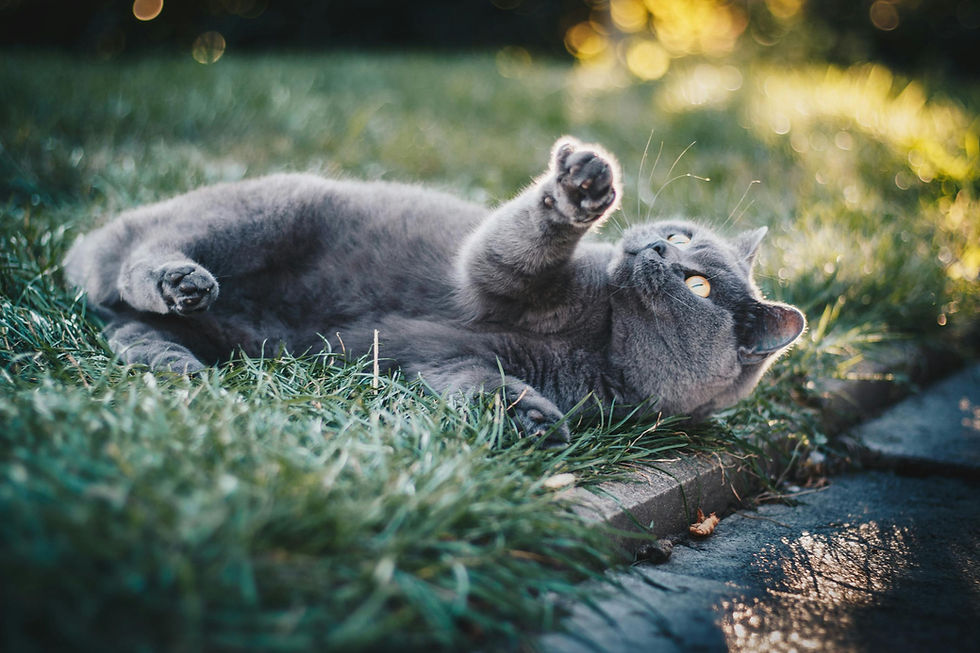3 Most Common Cat Allergies and Their Symptoms
- mari7499
- Mar 23, 2022
- 3 min read

If you've noticed your cat scratching excessively, losing hair, experiencing a runny nose or eyes, or suffering from itchy or infected ears, there's a chance allergies are to blame. Like in humans, cats' allergies can be caused by everything from environmental sources like pollen and dust to food or even flea bites.
Below, we'll go over the three most common cat allergies, their symptoms, and tips for how to identify and manage your cat's allergic response.
Signs your cat has allergies
Cat allergy symptoms are incredibly varied. To complicate matters further, the symptoms are often similar regardless of the allergy source, making it challenging to determine what your cat is reacting to.
Here are the symptoms to watch for:
· Excessive scratching or chewing on the skin or paws
· Overgrooming
· Skin lesions
· Flaky skin
· Hair loss
· Dull coat
· Sneezing
· Coughing
· Wheezing
· Runny nose and/or eyes
· Swollen paws
· Vomiting
· Diarrhea
· Itchy or infected ears
Common cat allergies
Let's look at the three primary sources of feline allergies, the symptoms, and the potential treatment options.
Fleas
Flea allergy, also known as flea allergy dermatitis, is the most common allergy in cats. Cats with flea allergies experience extreme reactions, even to just a few bites.
When a flea bites a cat, antigens from their saliva enter the cat's body. If a cat is allergic, their body will misidentify these flea antigens as harmful toxins and begin attacking them vehemently.
The allergic reaction can make your cat's skin incredibly itchy, leading them to scratch excessively, chew at the itchy spots, or over-groom. As a result, your cat may begin losing hair or even develop sores on their skin from all the scratching and grooming.
You may also notice tiny scabs on your cat's skin, particularly around the neck and at the base of the tail. These are called miliary dermatitis and are another common allergy symptom.
Flea allergies can be challenging to identify because cats who are allergic to fleas will groom so much that the fleas will be almost impossible to spot. To protect your cat from flea bites, follow a regular flea-prevention regimen with guidance from your veterinarian.
Environmental allergies
Environmental allergies in cats are known as feline atopy, and can be triggered when a cat breathes in an allergen or absorbs it through their skin.
Like humans, cats can be sensitive to many allergens in their environment, including pollen, mould, dust mites, animal dander, and even grass. Your cat may also be allergic to fragrances in your cleaning products, laundry detergent, and even their cat litter.
The symptoms for these allergies can be varied but may include sneezing, coughing, wheezing, runny nose and eyes, skin irritation, excessive scratching, flaky skin, and more.
Some environmental allergies, like pollen and grass, may be seasonal. If you notice your cat exhibiting allergy symptoms in the spring or summer, limiting their exposure to the outdoors may alleviate some of the symptoms.
Because the symptoms of environmental allergies are so similar, vets typically use a rule-out method to diagnose them. This means they take steps to systematically exclude potential allergens until they narrow in on the culprit.
There's no cure for these allergies, but if you can identify the allergen and limit your cat's exposure, you may be able to save them some discomfort. Your vet may recommend treating the symptoms with medications like antihistamines, medicated shampoos, or anti-itch ointments.
Food allergies
Food allergies are the third most common allergy in cats, and they are suspected to exist in somewhere between ten and 49% of all cats. Food allergies are challenging to predict and diagnose because every cat is different, and what triggers an allergic response in one cat could be totally fine for another cat.
Signs your cat has food allergies include diarrhea, vomiting, hair loss, flaky skin, and excessive scratching.
Your vet will likely recommend an elimination diet to identify the trigger for a food allergy. You will slowly add ingredients back into your cat's diet until you can locate the source of the allergy.
What to do if you suspect your cat has allergies
If you've noticed your cat is experiencing any of the symptoms discussed above, speak to your veterinarian. Allergies can be incredibly uncomfortable for your cat, but your vet will help formulate a treatment plan that alleviates the symptoms and restores your cat's quality of life.







Comments